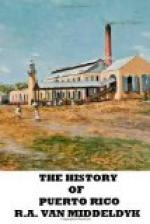During the interval between the departure of General Baldrich and the arrival in April, 1873, of Lieutenant-General Primo de Rivero, there happened what was called “the insurrection of Camuy,” in which three men were killed, two wounded, and sixteen taken prisoners, which turned out to have been an unwarrantable aggression on the part of the reactionists, falsely reported as an attempt at insurrection.
General Primo de Rivero brought with him the proclamation of the abolition of slavery and Article I of the Constitution of 1869, whereby the inhabitants of the island were recognized as Spaniards.
Great popular rejoicings followed these proclamations. In San Juan processions paraded the streets amid “vivas” to Spain, to the Republic, and to Liberty. In Ponce the people and the soldiers fraternized, and the long-cherished aspirations of the inhabitants seemed to be realized at last.
But they were soon to be undeceived. The Republican authorities in the metropolis sent Sanz, the reactionist, as governor for the second time. His first act was to suspend the individual guarantees granted by the Constitution, then he abolished the Provincial Deputation, dissolved the municipalities in which the Liberal reformists had a majority, and a new period of persecution set in, in which teachers, clergymen, lawyers, and judges—in short, all who were distinguished by superior education and their liberal ideas—were punished for the crime of having striven with deed or tongue or pen for the progress and welfare of the land of their birth.
FOOTNOTES:
[Footnote 53: Estudio Historico. San Juan, 1899.]
[Footnote 54: Cards, rum, and women.]
[Footnote 55: He had been President of the Royal Academy.]
[Footnote 56: El Porvenir, for the Liberals, the Boletin Mercantil, for the Conservatives.]
[Footnote 57: Extracts from the History of the Insurrection of Lares, by Jose Perez Moris.]
CHAPTER XXVI
GENERAL CONDITIONS OF THE ISLAND—THE DAWN OF FREEDOM
1874-1898
The Spanish Republic was but short lived. From the day of its proclamation (February 11, 1873) to the landing in Barcelona of Alphonso XII in the early days of 1876 its history is the record of an uninterrupted series of popular tumults.




